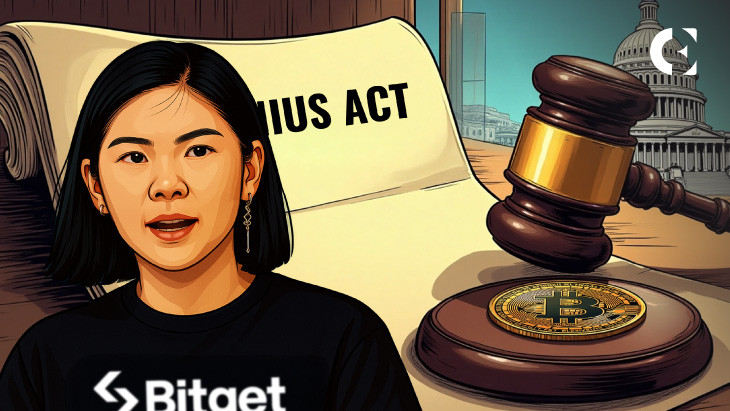- The GENIUS Act establishes a regulatory framework for stablecoins, backed by U.S. Treasury reserves.
- Bitget’s Gracy Chen says USDC and USDT market caps could grow 20–30% annually under the new law.
- Smaller stablecoin issuers may face compliance challenges, leading to possible market consolidation.
Bitget CEO Gracy Chen says regulated stablecoins like USDC and USDT could see 20% to 30% annual growth under the newly advanced GENIUS Act. The U.S. law brings stablecoins under formal oversight, aiming to boost trust, drive institutional adoption, and strengthen the global role of the U.S. dollar.
The bill now moves to the House of Representatives for review, with President Trump urging its swift passage.
GENIUS Act to Drive Stablecoin Adoption
Notably, the GENIUS Act requires stablecoin issuers to maintain reserves backed by U.S. Treasury securities.
This measure aims to reduce risk, increase transparency, and tie digital assets more closely to the strength of the U.S. economy.
Related: Trump’s Push for Speed Puts Senate-Passed GENIUS Act to a Political Test in the House
Growth Potential for USDC and USDT
In her commentary, Bitget’s Chen stated that the GENIUS Act will encourage wider adoption of regulated stablecoins. Taking to X, she predicted that leading dollar-backed stablecoins such as USDC and USDT could grow their market capitalizations by up to 30% annually, assuming favorable market conditions.
“In a world craving safety and predictability, this regulatory clarity is a green light for institutions and a trust layer for investors,” Chen said.
Regulation as a Trust Builder
Furthermore, Chen emphasized that regulation, while sometimes viewed as restrictive, is essential for the long-term health of financial markets. She compared regulators to parents: “annoying but necessary,” she said in a video.
While the GENIUS Act may benefit major stablecoin players, it could also create barriers for smaller issuers. The law’s reserve requirements may prove too costly for startups and niche stablecoin providers. This could lead to industry consolidation, with fewer but more compliant stablecoin issuers dominating the market.
Details of the GENIUS Act
On June 18, the U.S. Senate passed the Guiding and Establishing National Innovation for U.S. Stablecoins (GENIUS) Act with a decisive 68–30 vote. This established the country’s first-ever federal framework for regulating stablecoins.
Introduced by Senator Bill Hagerty and backed by bipartisan figures including Senators Cynthia Lummis and Kirsten Gillibrand, the legislation mandates that all stablecoin issuers maintain full reserves of liquid assets such as U.S. Treasury notes.
Oversight will fall to the Federal Reserve for major issuers and the Office of the Comptroller of the Currency for smaller entities. The bill also includes anti-money laundering requirements and prohibits members of Congress and top executive officials from issuing stablecoins while in office.
The passage could ignite significant growth in the $260 billion stablecoin market. Treasury Secretary Scott Bessent projects the market could balloon to $3.7 trillion by 2030. This could draw in tech giants like Apple and Google to launch their digital currencies after meeting specific risk management and privacy protections.
While praised by much of the crypto industry, the bill has faced criticism for offering what some, including Senator Elizabeth Warren, call “light-touch regulation” and for neglecting broader cryptocurrency oversight.
Related: U.S. Senate Passes the “GENIUS Act” Stablecoin Bill in a 68–30 Bipartisan Vote
At the moment, the bill has now moved to the House of Representatives for further review. President Trump has urged lawmakers to pass it promptly to ensure continued U.S. leadership in digital assets.
Meanwhile, Polymarket bettors are placing strong odds, 89%, on the bill becoming law before 2026.
Disclaimer: The information presented in this article is for informational and educational purposes only. The article does not constitute financial advice or advice of any kind. Coin Edition is not responsible for any losses incurred as a result of the utilization of content, products, or services mentioned. Readers are advised to exercise caution before taking any action related to the company.







